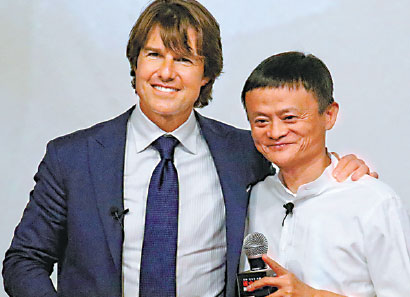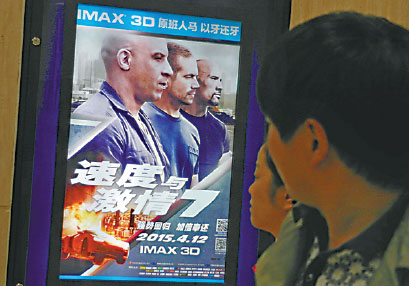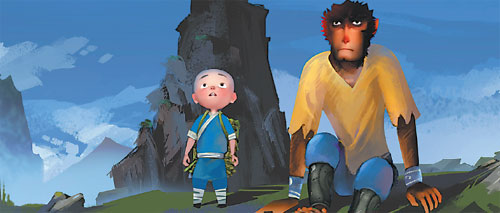
 |
|
WANG XIAOYING/CHINA DAILY |
Cinema typically prospers during slowdowns, and insiders think new films will turn box offices to gold, Xu Fan reports.
China's box-office chart has seen new records set frequently in recent months. The latest big high-this year's first three-quarters raking in more money than all of 2014-has sparked predictions that 2015 will roar all the way to 40 billion yuan ($6.25 billion).
Powered by a strong summer season, the world's second-largest movie market grossed about 32 billion yuan from more than 320 movies in the first nine months of 2015, according to box office tracker Cbooo.cn.
Last year, the country's rapidly growing market brought in total box-office revenue of 29.6 billion yuan, a mark reached by Sept 2 this year, nearly four months earlier than last year.
Based on the frenetic growth rate, many insiders-including the analysts and experts contacted by China Daily-estimate that 2015 will pass the 40 billion yuan milestone, and some even predict 45 billion.
However, a longtime concern for Chinese films lingers. A big section of the booming market features foreign rivals, although domestic films are chipping away at their dominance. The country's top movie regulator said around 60 percent, or 18 billion yuan, of the nine-month box office receipts were taken by domestic titles.
That's up significantly from last year's 54 percent.
In a positive sign to Chinese moviemakers, the homegrown live-action animated film Monster Hunt beat out the strong Hollywood rival Fast and Furious 7, a high-octane action blockbuster, to become the highest-grossing title in the history of Chinese cinema.
Thanks to its extended release of up to 63 days-a normal span for big movies is around five weeks or less-and creative characters, Monster has brought in 2.44 billion yuan, a slim lead over Furious 7's 2.43 billion yuan.
Despite the top glory, three of the other Top 5 big-grossing films were titles from the United States.
Marvel's superhero adventure Avengers: Age of Ultron takes the third slot with a total box office of 1.46 billion yuan, followed by Jurassic World at 1.42 billion yuan and the Chinese-language pop comedy Jian Bing Man at 1.16 billion yuan.
This year's Spring Festival season champion, The Man from Macao II, wound up in the sixth slot with 974 million yuan, while another Spring Festival favorite, Dragon Blade, dropped to 10th with 744 million yuan.
Unlike most of the blockbusters boasting megastar casts and big budgets, such as The Man from Macao II with Chow Yun-fat and Dragon Blade with Jackie Chan, the seventh-largest-grossing film, Monkey King: Hero Is Back, shocked the insiders as one of this year's most surprising dark horses.
With fewer screens and limited marketing, the domestic animated flick grossed 956 million yuan, replacing the Japanese hit Stand By Me Doraemon to surge to the top as the all-time highest grossing animated film in China.
The recently released espionage thriller Mission: Impossible-Rogue Nation takes the eighth seat with 820 million yuan, closely followed by The Hobbit: The Battle of the Five Armies with 766 million yuan.
More major movies are crowding cinemas during the golden National Day Holiday week, raising insiders' hopes for a cash bonanza in the coming weeks.
For most of the industry insiders, the "lipstick effect" has become a frequently talked about theory to explain China's booming market, which stands in contrast to the lethargic overall economic picture globally.
The concept, coined in the West, is based on the idea that women spend more money on affordable items as substitutes for luxuries during times of economic uncertainty.
"Historical cases from the world's major markets show that the movie industry enjoys support during the times of economic downturn. And it's similar for China," said Cheng Jiaqi, managing director of Fundamental Films, a Shanghai-based company that has a close connection with Hollywood and European studios.
When the country's economy experiences slower growth, its moviemakers prosper-a theory borne out by the average annual growth rate of more than 30 percent over the past five years.
 |
|
Tom Cruise and Jack Ma, CEO of Alibaba, attend the Shanghai premiere of Mission: Impossible-Rogue Nation. China Daily |
"Having fun at the cinema can let people shake off worries over career struggles and daily life pressures, which may explain why comedy has become such a popular genre in recent years."
More screens
The growing number of theaters with multiple screens is regarded as another major factor in the booming market, according to Tan Fei, president of the Beijing film studio Eracme Entertainment, which has teamed up with a Hollywood company to produce the first English-language film based on China's traditional tale of the Monkey King.
"The rapidly growing number of screens combined with the expanding base of China's middle-class families is driving big growth," Tan said.
The country now boasts 28,000 screens in more than 5,800 cinemas, and more will be built in third- and fourth-tier cities. Insiders predict the screens will hit 50,000 by 2020, according to domestic media outlets.
Improved technology and the involvement of Internet giants in recent years have become strong supporting pillars for the industry, said Zuo Heng, deputy director of cinema studies at the China Film Archives.
Major Internet companies Baidu, Alibaba and Tencent have all established film arms and aim to form a complete chain from production to marketing and distribution.
Relying on their huge customer base, the cyberspace companies' strength is collecting big data to tailor films for targeted audiences. A slew of big-earning titles, such as the Tiny Times and Lost franchises, trace their commercial success to connections with large online fan bases and research into fans' preferences.
Some directors have begun to see themselves as production managers rather than artists, as hunting for box office success has become a primary task.
Most of the insiders worried that the box office domination index for judging movies will lead to "unhealthy" developments.
"After all, the movie industry is a business relying on creativity and innovation. When producers and directors concentrate on replicas of blockbusters, they may get lost in stereotyped characters and storylines," said Zhu Yuqing, director of the industry research department of the Chinese Association of Film Critics.
"That China will take over the United States to become the largest movie market in two years is a common view of industry insiders. But Chinese filmmakers should be alert and cautious," he said.
"Only the good tales and quality movies will survive the fierce competition."
Contact the writer at xufan@chinadaily.com.cn
 |
|
Chinese moviegoers pass a poster for Fast and Furious 7, which is the highest-grossing foreign movie in China this year. China Daily |
Box office top 10
1. Monster Hunt: 2.44 billion yuan
2. Fast and Furious 7: 2.43 billion yuan
3. Avengers: Age of Ultron: 1.46 billion yuan
4. Jurassic World: 1.42 billion yuan
5. Jian Bing Man: 1.16 billion yuan
6. The Man from Macao II: 974 million yuan
7. Monkey King: Hero Is Back: 956 million yuan
8. Mission: Impossible-Rogue Nation: 800 million
9. The Hobbit: The Battle of the Five Armies: 766 million yuan.
10. Dragon Blade: 744 million yuan
 |
|
Monkey King: Hero Is Back is the all-time highest-grossing animated film in China. China Daily |

Presented by Chinadaily.com.cn Registration Number: 10023870-7
Copyright © Ministry of Culture, P.R.China. All rights reserved